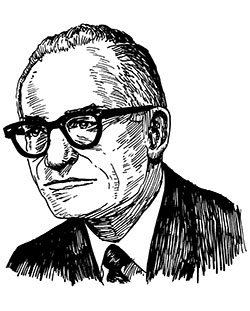
You weren’t one of Barry Goldwater’s speechwriters. How did you come to write his most famous speech?
For most of the campaign, I was on the payroll for the American Enterprise Institute. And I went to the Republican convention with a group of scholars who were sitting in on the platform committee hearings, just to keep our eyes and ears open and see if there was anything constructive we might have to say. After a meeting where I heard Nelson Rockefeller warn about the dangers of extremism, I wrote a two-paragraph memorandum with the line about extremism in defense of liberty. Somehow that filtered up to Goldwater. Then he said he wanted his speech written around those lines.
Celebrating extremism doesn’t seem like a way to win over undecided voters. Did you think Goldwater had a chance?
The people close to Goldwater thought he had a shot, but I didn’t think so. Look at the political circumstances: The country was very prosperous, the Vietnam War was just a small cloud on our horizon, and Kennedy had just been assassinated. I thought of the Goldwater campaign as an attempt to educate the American people and the conservative movement itself, which I hoped to influence.
What was the conservative movement like before Goldwater’s candidacy?
It called for stronger foreign policy than the Kennedy administration was pursuing, and had a general commitment to free enterprise and against state socialism. Back in ’64, federal revenues were rapidly increasing. But instead of lowering taxes, that money went into the War on Poverty, which supplied half of the jobs for the Democrats but never did anything to make the poverty level less.
I had read Friedrich von Hayek’s The Road to Serfdom, and it convinced me that some version of the free-market economy was the basis for a free society. When I spoke on campuses, I emphasized that a rapid increase in federal revenue should not be used for new programs. But we certainly had no intention of getting rid of Social Security or any of the things that were in place with the New Deal. Remember: Ronald Reagan and I were both good New Dealers. But we believed that as the business community revived, as it did through the war, there wouldn’t be much need for the kinds of things the New Deal did.
Many people see Reagan’s presidency as the culmination of the conservative movement galvanized by Goldwater. Was Reagan really the heir?
Yes. In 1983, Reagan gave the Goldwater campaign all the credit for forming the principles of his administration. I made a speech in 1965 where I told people that the reputation of the Goldwater campaign would be determined by events that had not yet happened. That was a pretty good prediction. It gave us a platform, and it gave a great impetus to the conservative movement. Even when we went down to what looked like a bad defeat.
If Reagan had been a candidate in 1964, he wouldn’t have gotten any more votes than Goldwater did. And if Goldwater had been a candidate in 1980, he would’ve gotten the same votes as Reagan did. The art of politics is judging what circumstances permit and what they forbid. Look at the reputation of, say, John Brown and the abolitionists before the Civil War. Lincoln had very harsh things to say about John Brown in 1859. The Civil War vindicated John Brown.
And do you think the Reagan Revolution continues with today’s Republican Party?
Political parties are always being formed and re-formed. They’re never a fixed entity. The great danger to the Republican Party right now is Ron Paul and the—what do they call themselves?
The tea party?
Yeah. As far as I’m concerned, they’re anarchists. And they’re no different than Communists in their opposition to capitalist government. Remember, the ultimate object of Marxist Communism is to return to the Garden of Eden with no forbidden fruit. That’s the goal of libertarianism as well. And we’re marching rapidly in that direction. Morality is disintegrating in front of our eyes.
So why do you continue to be such a supporter of the Republican Party, especially since its libertarian wing is ascendant?
Well, I think if Obama is reelected, then that’ll be a disaster of immeasurable proportions. If the government takes over large segments of the economy, we will become a socialist state.
The salvation of the Republican Party, and of the country and of the world, will be changing the conservative moment to reflect the principles of Abraham Lincoln. The platform on which Lincoln was elected in 1860 quoted part of the Declaration of Independence: Government is based on the consent of the governed.